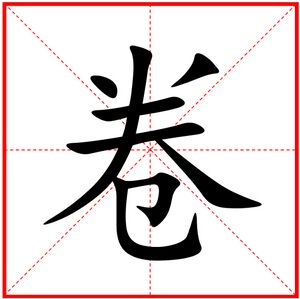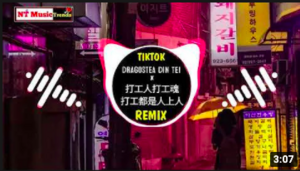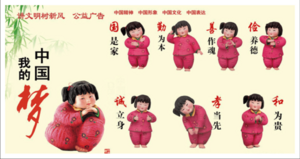Course:ASIA319/2022/"Volution" (卷)
Introduction

We can understand the mainstream thinking of today's Chinese society, as well as the problems and pressures that most Chinese people face in society through the popularity of the word "volution"(卷). As a newly emerging Chinese slang, "volution" (卷), to a considerable extent, shows the attitude of Chinese people towards all sorts of activities in their daily life, such as studying or working (as long as it involves any aspect of competition). The sudden popularity of the term seems to be a playful catharsis of excessive competitive pressure within today's Chinese society.
"Elite Class" students at Xinyang Senior High School in Henan province had only 22 hours to enjoy their Spring Festival holiday. They were required to attend classes as usual during the holiday and study independently (for at least 10 hours per day) under the supervision of their teachers. The school believed that this arrangement was to help students achieve better grades, and students should be thankful that they are given this opportunity to study. It should be noted that, except for the students in the elite class, other students in the "ordinary class" only have three days of vacation during the Spring Festival (the Chinese Spring Festival holiday is seven days). This is a screen shot from a video uploaded by Xinyang Senior High School's students. The original video was banned, but it was re-uploaded by other users later. To view the full video, click here. [1]

The following is the translation of the image on the right which demonstrates the extent of involution that the students are facing within the Chinese education industry.
Dear Parents and students. In one week we will enter the second semester of high school. There are less than 500 days until the 2023 Gaokao! For the ideal of the child, for the hope of the family, for the future of the motherland, we must continue to struggle for a better future!
- January 28th: Self study in the virtual meeting room.
- January 29th: Attend class as usual, class ends early at 3pm to let students relax.
- January 30th: Students are to attend class as usual.
- January 31st: Self study from 7:30-8:00, 8:00-11:00, afternoon 3:00pm to 5:30pm students will attend virtual classrooms to study independently.
- January 31st: afternoon 3:00pm HAPPY NEW YEAR
- February 1st: 3:00pm to 5:30pm and 7:30pm to 10:30pm, students are to attend virtual class meetings as usual and study independently.
- February 2nd: 7:30am to 11:00am, afternoon 3:00pm to 5:30pm, evening 7:30pm to 10:30 pm, students are to attend virtual class meetings as usual.
The implications of this phenomenon will be discussed in the following sections.
The genesis of the keyword
Except for its explicit dictionary meanings, the derived meaning of the word "卷“ (volution) comes from the popularity of "内卷" (involution). The genesis of the word "involution came from a few pictures of elite students' life in school. In these pictures, some students read books on bicycles, some students' beds are covered with different kinds of text books, and some students even write their term papers on laptops when they are riding their bicycles. With the popularity of these pictures on Chinese social media, popular words such as "清华卷王" (King of Involution in Tsinghua University), who was riding a bicycle while using a laptop, became extremely popular on China's major social media platforms. It is a description used (mainly) by college students to ridicule irrational internal competition and the pressure that they have to deal with in their everyday life.[2]
Glossary of its explicit dictionary meanings
Note: The exact meaning of the word will change with the pronunciation.
- Quan2: Bending. Example: used to describe 膝曲(Bending knees) in ancient Chinese. *This pronunciation is not used as often today. (Shuowen Jiezi)[3]
- Juan3: Verb-Bend. Example: Bend an object into a cylindrical shape. Example: 卷曲(curl) [4]
- Juan4: Noun-Refer to files and documents AND Calligraphy and painting that can be stretched and bent into a cylindrical shape. Example: Bamboo and wooden slips, 卷宗(dossier) [5]
- A rare last name [6]
"卷" in contemporary Chinese popular culture
Actual usages and variegated meanings

In addition to the dictionary meaning and use of juan (卷), this word has been quite popular in recent years and adopted extremely frequently in everyday conversations and online discussions. People usually use this word to describe a particular behavior or situation. For example, almost all of the performers in a Chinese stand-up comedy TV show, Rock&Roast, have a master's degree, and more than half of them have a Ph.D[7]. People describe this situation by using neijuan (内卷) toward education background, which means that the average education level in this industry is so high that makes the competition stronger.

Moreover, the word “卷王“ or “ the king of volution” has been frequently used on social media as one of the most popular topics. The term juanwang (卷王) describes people who are completely good at doing something which makes them stand out from the crowd in a specific scenario. However, the use of the word volution nowadays becomes more of an amusing word than a formal one. Most people who post or talk with this word do not mean it seriously, which makes this word become more like a network buzzword. This enables people to use volution as a popular word to describe a situation or express their views in an easier way.
Associated words
Neijuan (内卷)
Neijuan is the most popular form of usage of the single word juan. It was first introduced by an American anthropologist, Alexander Goldenweiser, in the term of Neijuanhua (内卷化) or involution.[8] People usually use the word juan as a simple form of neijuan for them to mention it in a more flexible way. Neijuan in contemporary Chinese culture means the behavior of internal volution, namely a strong competition level inside a particular industry or a party.[9] For example, the education industry has a very high degree of Neijuan so students have to learn and improve their extracurricular skills and techniques in order to be admitted by their ideal university. Schools also want their students to get higher marks than others, so they force students to learn extra hours and take more classes during their vacations to prepare for their exams.
Fanneijuan (反内卷)
Fanneijuan means anti-volution, which is introduced due to the popularity of the word neijuan. Because neijuan has brought a strong sense of competition among a group of people and led to the complaint of people toward the spirit of working hard and striving for academic or work excellence,[10] the emergence of this word, fanneijuan, depicts an attitude of refusing to get involved in such a strong competition and keeping their own pace of work without anxiety and stress about the current situation.[11] People use this word to encourage others to stop feeling stressed about their study or work and care more about their own improvements instead of their places in the industry.
Waijuan (外卷)
The word waijuan does not mean the competition in an external environment. Instead, it means the use of outside resources to apply to one’s own condition so that it will have more strengths to compete in the environment of neijuan.[12] It is not widely adopted by Chinese popular culture nowadays, therefore, there is a limited usage on social media and in daily conversations. It is more frequently mentioned in academia.
Dagongren (打工人)

Dagongren refers to people who strive for self-actualization in the workplace. Lots of people use this word to describe themselves as ones who work hard every day just for some extrinsic compensation and achievements.[13] It is usually used to encourage themselves to work harder, for example, “Good Morning, dagongren” means that today is a new day and you should keep working hard just as you did yesterday. It reflects a sense of helplessness toward their lives although it is expressed in a humorous sense. People’s stress from work and life can be reduced slightly through self-ridiculing by using this word.[14]
Fanersai (凡尔赛)
One of the most popular words in China in 2020, fanersai, means behaviors of expressing the nobility and excellence of one’s life and achievement through an indirect and implicit approach.[15] For example, by saying “I feel too disappointed that I got only 98% out of 100% in the final exam of this senior programing course,” one shows how great he or she did in a difficult course. This can make others feel quite uncomfortable and envious.[16] Fanersai has some other words associated with it as well, such as fanxue (凡学), meaning the art of doing fanersai, and fanlifanqi (凡里凡气), namely a temperament of a person who often does fanersai.
Tangping (躺平)
The original meaning of the word tangping means the attitude of stopping desperate hard work and lowering life desires.[17] It is often used to describe young adults who should get involved in the competition in a crowded industry but decide to give up and feel satisfied with their current status. There are usually two types of tangping: evasive and helpless.[18] Evasive tangping describes people who actively reduce their desire for life and choose to keep their current life condition. Helpless tangping means that people still want to become successful but fail to achieve their goals and therefore have to maintain their present status.
Deconstruction of scholarly and dictionary meanings
The word juan (卷) was first applied in the area of agriculture in the 1950s by Clifford Geertz from MIT Center for International Studies and was often used as a terminology in Chinese sociology studies as neijuanhua (内卷化).[19] For example, there was a huge increase in Chinese population beginning in the Qing Dynasty, from 70 million to more than 400 million, which significantly lowered the labor cost and reduced the intrinsic driving force of the Technological Revolution. This eventually led to the Agricultural Volution (农业内卷化).
The original meaning of juan has been distorted and deconstructed through the usage of this word as an Internet popular word. Its official paraphrase is an increase in the intensity of an industry with no actual development inside it.[20] In other words, there is a development problem due to the increased average competency of people inside the industry or the market. Despite increased individual efforts, many people feel frustrated by the unchanged career outcomes. However, the word juan is more often to be adopted to describe a particular behavior, which shows the distortion and deconstruction of its original meaning, from a profound development issue to a specific behavior pattern. With the increasing popularity of the usage of juan as a network buzzword, the real meaning and potential danger of volution has been ignored to some extent. The cocktail party effect indicates that people tend to ignore voices with extra information when they are focusing on one particular thing or listening to one voice.[21] According to scholars, this can also be applied to a social phenomenon: when the word juan has been played off and used to tell jokes, there are less people who care about the actual definition and how dangerous this phenomenon is.
"卷" in non-Chinese cultures
Singapore
In Singapore, a term called kiasuism shares a similar notion to involution in China. Kiasuism is a distinguished cultural trait of Singapore that include the characteristics such as self-centeredness, money-mindedness, greed, and inconsideration. This term expresses the fear of losing out, which refers to a natural reluctance to fall behind or always wanting to be ahead of others. Kiasuism can be seen both in positive and negative attitudes. Positive kiasu attitude describes someone who diligently works hard to stay on top of the situation, while negative kiasu attitude describes someone with jealousy and egocentric behaviors. A student is said to be kiasu if they don’t want to share academic information or deliberately hides the truth from others to gain an advantage. For example, a kiasu student would collect all the past papers, hide study secrets, and lie about their project status to put the others at ease so that they can go ahead of them.[22]

South Korea
Although there is no term equivalent to involution in Korea, this social phenomenon is continuously brought up through different popular culture forms. A 2018 TV series called “Sky Castle” gained huge popularity in South Korea. This series examines the excessive competition for college admissions in South Korea. In 2020, another TV series called “The Penthouse: War in Life” is released and immediately becomes popular. This series is also about competition for college admission, but this time it takes place in a high school of arts. The most recent 2021 TV series “High Class” is about competition for admissions to an elementary school. These TV series demonstrates involution of Korean education in different age group, suggesting that the term exists everywhere. In all these TV series, we are seen parents and students doing whatever it takes to win over others. These media forms reflect the high expectation of parents and society creating involution.[23]
United States
Although educational involution is more known to exist in Asian cultures, there are signs of involution in the western culture as well. As the overall acceptance rate to Ivy league schools have been dropping,[24] high school students in the United States now not only have to study hard, but they also need to take various college level courses and find volunteers opportunities to gain advantage for college applications. Helicopter parenting is a term referring to parents who participate, invest, and control their children's lives and education. These parents often feel the need to ensure their child’s future success.[25] Therefore, to get their children into top universities, many parents have transformed into helicopter parents. With that being said, helicopter parenting is an outcome of involution in the education system in United States.
Social, cultural, and political problems
Social Problems - Income Disparity and Lack of Opportunities

After the implementation of Deng Xiaoping’s Open Door Policy in 1979, China has been one of the fastest-growing nations. This rapid growth has allowed China to emerge as a major economic power in about four decades.[26] However, there continue to exist major income disparities between rural and urban areas in the country.[26] Despite having the largest number of billionaires in the world, around 600 million of the people’s monthly income do not exceed ¥ 1,000 (~ $200 CAD).[27] This inequality has led to the feeling of frustration from the young generation against the rich – in the increasingly more competitive society, most are not given the same opportunities and cannot succeed as easily compared to the older generations.[27] Moreover, many are expressing that if they do not work hard enough, they will be replaced by others in society. Professor Biao Xiang from the University of Oxford describes this sentiment as that “the young continue to feel if they don’t work hard or participate in the competition they will be ousted by society, but they don’t see a breakthrough for themselves despite their repeated efforts”.[27] This frustration felt by the young generation explains the popularity of “juan” 卷, as most feel stuck in a continuous cycle that does not result in innovations or productivity.
Cultural Problems – “996”
Juan 卷 has often used to describe the feelings of those working a schedule of “996”. "996” is described as employers requiring employees to work six days a week from 9 am to 9 pm. This toxic work culture is gradually becoming the norm in China, especially in the tech industries.[28] Although the practice of 996 is against the Chinese labour law, little has been done to protect the workers. Moreover, scholars have labeled this practice as modern slavery and labour exploitation.[28][29] An explanation for this tolerance could be stemmed from a conflict between Confucianism and capitalism that is making employees extremely vulnerable in their work environment.[29]

Confucianism remains a valuable ideology system in China and has a long-rooted history in the nation. According to Jenny Jing Wang, a scholar from the University of Wollongong, the theory emphasizes “a respect for hierarchy, a stringing for harmony and expectations of filial obedience, especially for those lower in the power/distance relationship”.[29] This system allows corporations to exploit the labour of employees as workers are expected to complete the tasks from their employers without questions. On the other hand, capitalism seeks out supply chains of cheap and disciplined labour without the regulations of labour rights.[29] Because of this, Western corporations have extended their supply chains into China, and “local producers must cut the cost to maintain their position in the supply chain even at the risk of ignoring national labour laws.”[29] With the combination of Confucianism and capitalism, Juan is thus used when workers bribe their employers for work reliefs, working extra hours than others to get promotions, or to avoid being laid off.
Political Problems
The concept of Juan can flourish in China stems from its alignment with the socialist values promoted by the government. The Chinese Communist Party (CCP) has managed to promote “core socialist values” to maintain its legitimacy through the propaganda campaign, China Dream 中国梦.[30] Specifically, the CCP romanticizes its socialist past in order to justify the party’s role in providing moral authority and guidance for the population.[30] For instance, there is a clear distinction between “normative values” such as prosperity, civility, and justice, and “aspirational values” such as democracy and harmony. While normative values are guaranteed under socialism, aspirational values can only be achieved through one’s own hard work.[30] However, it is important to note that these concepts have different meanings than the conventional definition. The concept of harmony is developed by the CCP as a solution to an increase of socio-economic inequality resulting from rapid market development. The idea of harmony approved by the CCP specifically suggests that there should be “cooperation among all strata of society in order to achieve the mutual goal of a prosperous society”.[30] In other words, citizens should not question the orders from above and should work hard together for a better future. The same sentiment is echoed again in 2018, when President Xi Jinping states that China's new era “belongs to those who work hard”, and “happiness can only be achieved through great endeavours”.[27] This statement clearly endorses the issue underlined by juan 卷, where young people feel they are pushed to work or they will be ousted by society and the others around them.
The Relationship of Neijuan, Foxi, and Tangping
Xinyuan and Yuqi's paper recognizes and classifies the different stage of juan in the perspective of young adults under the macro environment and complicated society conditions. It explains the reason that the word juan could be so popular among modern society in recent years. The reason for the prominent phenomenon of "neijuan" in the current society lies in the rapid development of higher education in the context of rapid information flow society as well as the increasing social density under the existing social capacity[17], which results in the high level of occupational competition among individuals. In addition, the reason why juan spreads in the public, especially in the youth group, is because the collective feeling of "being involuted" forms a social atmosphere, and people feel a strong pressure together, and eventually choose the same juan lifestyle passively.

There are several social indications and factors that are correlated to the phenomenon of juan in Chinese modern society, as described in the paper. For instance, the main cause of this would be the acceleration of social functioning which amplifies anxiety and push people to live in a technologically fast-forward style and accomplish their work goals or meet requirements by investing more and more time and effort. Scholars have expressed that "people have experienced that the power of acceleration is no longer a liberating force, but a pressure that enslaves them."[17] The social iteration speeds up, and everyone is afraid of being abandoned by society and is carried forward to juan.
But there are also increasing uncertainties in society, as well as anxiety and dissatisfaction when goals are not achieved. Under the multiple pressures of work and life, the negative emotions of young people keep rising. They choose to deconstruct the "sick" struggle concept at the expense of sleep time or physical health, and vent their pressure by criticizing neijuan, making fun of foxi, and appealing tangping[17]. Thus, there is a contradiction between juan and tangping among young people.
The Inequality in the Chinese Education Industry
In Silin and his team's study regarding the admission rate of students with different family background in Peking University[31], they surveyed students who were admitted and had an urban family background versus students who were born in other cities. The study shows that students who were born in Beijing are more likely to be admitted than students from other cities due to the different standards of admission.[31] The GPA cutoff for local students is generally lower than that for others, which makes those from rural regions have to study harder than others in order to be admitted by the first-tier universities.
A similar situation happens in Shanghai as well. Therefore, a lot of high schools in China try to persuade and even force students to learn extra hours and shorten their vacations due to the fierce competition in the education industry. The number of students admitted by top universities in Beijing and Shanghai is always limited, therefore, they have to study hard and also equip with extracurricular skills to stand out from the crowd.
Chinese Internet Buzzwords
In Zhou Yan’s “Chinese Internet Buzzwords: Research on Network Languages in Internet Group Communication”, she discusses the characteristics, motivation and implications of network language.[32] Although juan became popular after the publish of this journal, it can be analyzed as a network language based on her research.
Yan’s description of characteristics of network language is as follows: short, concise, and easy to spread. It reflects popular social events and typical opinions and attitudes of the grassroots people. A key finding in Yan’s research is that many famous network languages are based on negative events or negative social phenomena that induce strong emotions among the subordinates.[32] Tracing back to the origin of the word ‘neijuan’ (内卷), this word first appears as a buzzword on internet with a photo of a Tsinghua university student working on his computer while riding a bike. What the image is showing is the result of the negative social phenomenon of extreme competition. The word is used to make fun of the picture, but it encompasses greater social value. For this, Juan can be categorized as a buzzword based on Yan.
Next Yan discusses the diverse motivation behind subordinate people’s access of Internet. Of many, the most common motivation is entertainment. As issues are repeated on social media, it makes many social events loose their seriousness and become an entertainment.[32] This can be observed with the juan phenomenon. This word encompasses the social issue of extensive internal competition and high expectation from the society. However, after juan becomes a buzzword, the seriousness of the topic deteriorated, and the word is used in daily lives with the purpose of humor. Another motivation behind internet use is escape. People no longer need to meet in-person to form interpersonal relationships and can easily obtain emotional support and spiritual comfort in the virtual world. While younger generation faces involution in their daily lives, by accessing the internet, it allows the users to build relationships, escape the reality, and freely comment, criticize, and communicate their feelings.[32]
Network languages manifest the collective memory of subordinate Chinese people and promotes social changes in China. The buzzword juan is a collective memory of younger generation and a word to express opposition and discontentment of the social issue with humor and cynicism.[32]
Conclusion
Overall, juan has been widely adopted in Chinese popular culture and the term represents a humorous attitude towards the fierce competition in society. Along with the popularity of the word juan, other words such as neijuan[8] and juanwang,[9] or the antonym tangping[18] also became popular. Originally stemmed from a viral image of a student riding his bike while studying in Tsinghua University, its popularity with the younger generation can be explained through the deep struggle that many relates to in China.[2] Many feel that if they do not work hard enough, they will be replaced easily by others both academically and in the work force. Furthermore, juan is used for workers to cope with the toxic work culture of 996,[29] which is a result of unrestricted capitalism and traditional Confucianism. Aside from China, the term is also evident as there exist fierce competition in other countries such as Singapore,[22] South Korea[23] or United States[25]. One way for government to address the problems outlined by juan could be to establish stricter laws to protect the workers' rights to avoid ruthless exploitation and increase opportunities for students. With that being said, by studying popular buzzwords, we can gain a deeper understanding of the underlying issue in societies and takes step to address them.
References
- ↑ "笑死,大年初一下午开学". bilibili. 2022/01/30. Retrieved 2022/03/13.
|first=missing|last=(help); Check date values in:|access-date=, |date=(help) - ↑ 2.0 2.1 Liu, Yi-Ling (2021/05/14). "China's "Involuted" Generation". The New Yorker. Retrieved 2022/03/04. Check date values in:
|access-date=, |date=(help) - ↑ Xu, Shen. "卷". 说文解字. Retrieved 2022/03/13. Check date values in:
|access-date=(help) - ↑ "卷:汉字卷的意思". 新华字典. Retrieved 2022/03/13. Check date values in:
|access-date=(help) - ↑ "卷:汉字卷的意思". 新华字典. Retrieved 2022/03/13. Check date values in:
|access-date=(help) - ↑ "卷姓起源、名人分布及起名大全". 百家姓大全. Retrieved 2022/03/13. Check date values in:
|access-date=(help) - ↑ "脱口秀演员们的学历内卷!硕士起步,最后一位你绝对想不到 | 脱口秀大会S4 ROCK&ROAST". YouTube. November 3, 2021. Retrieved March 12, 2022.
|first=missing|last=(help) - ↑ 8.0 8.1 ""内卷"一词出圈 年轻人为何会有内卷情绪?". ChinaNews. November 6, 2020. Retrieved March 13, 2022.
- ↑ 9.0 9.1 "Neijuanhua". Bilibili. September 8, 2020. Retrieved March 13, 2022.
- ↑ "Fanneijuan". Bilibili. March 24, 2021. Retrieved March 13, 2022.
- ↑ "谈谈"反内卷"". ChinaNews. November 17, 2021. Retrieved March 13, 2022.
- ↑ "Waijuan (外卷)". Bilibili. September 8, 2020. Retrieved March 13, 2022.
- ↑ "打工人、内卷……流行语背后除了自嘲、焦虑还有什么". ChinaNews. December 30, 2020. Retrieved March 13, 2022.
- ↑ "Dagongren in Chinese society". YouTube. September 14, 2021. Retrieved March 13, 2022.
- ↑ "火遍全网的凡尔赛文学,让你自卑了吗?". ChinaNews. November 11, 2020. Retrieved March 13, 2022.
- ↑ "Fanersai founder, Sa Beining, a well-known scene in Rock&Roast". YouTube. April 21, 2021. Retrieved March 13, 2022.
- ↑ 17.0 17.1 17.2 17.3 Xinyuan, Q. & Yuqi, D. (2022). ""Neijuan", "Foxi" to "Tangping"--The change of social mentality from the perspective of the cultivation of youth fighting spirit". Chinese Youth Studies. 02: 5–13. doi:10.19633/j.cnki.11-2579/d.2022.0018.CS1 maint: multiple names: authors list (link)
- ↑ 18.0 18.1 Longfei, L. & Yanlei, G. (2021). ""Tangping youth": An explanation for a structural dilemma". Chinese Youth Studies. 10: 78–84. doi:10.3969/j.issn.1002-9931.2021.10.010.CS1 maint: multiple names: authors list (link)
- ↑ "人人都在谈内卷,到底什么是内卷". Bilibili. September 8, 2020. Retrieved March 13, 2022.
- ↑ "Speaking of the essence of internal scrolling, how does a master crush "Struggle X"?". YouTube. May 12, 2021. Retrieved March 13, 2022.
- ↑ Cherry, E. C. (1953). "Some Experiments on the Recognition of Speech, with One and with Two Ears". The Journal of the Acoustical Society of America. 25: 975–979. doi:10.1121/1.1907229.
- ↑ 22.0 22.1 Bedford, Olwen, and Sheryl H. Chua. “Everything Also I Want: An Exploratory Study of Singaporean Kiasuism (Fear of Losing Out).” Culture & Psychology, vol. 24, no. 4, Dec. 2018, pp. 491–511, doi:10.1177/1354067X17693831.
- ↑ 23.0 23.1 정민승.(2019).스카이캐슬 읽기:입시정체성에 대한 후기구조주의적 접근.Education Review,(43),162-185.
- ↑ "ivycoach". ivycoach. Retrieved March 15, 2022.
- ↑ 25.0 25.1 Ishizuka, Patrick. "Social Class, Gender, and Contemporary Parenting Standards in the United States: Evidence from a National Survey Experiment." Social Forces, vol. 98 no. 1, 2019, p. 31-58. Project MUSE muse.jhu.edu/article/748344.
- ↑ 26.0 26.1 Morrison, Wayne M. (2014). "China's Economic Rise: History, Trends, Challenges, and Implications for the United States". U.S. Congressional Documents Library – via HeinOnline.
- ↑ 27.0 27.1 27.2 27.3 Wang, Fan; Wang, Yitsing (June 14, 2021). "The buzzwords reflecting the frustration of China's young generation". BBC News.
- ↑ 28.0 28.1 "China's 996 work culture is labour exploitation by another name". South China Morning Post. October 31, 2021.
- ↑ 29.0 29.1 29.2 29.3 29.4 29.5 Wang, Jenny Jing (2021). "How managers use culture and controls to impose a '996' work regime in China that constitutes modern slavery". Accounting and Finance (Parkville). 60: 4331–4359 – via Wiley Online Library.
- ↑ 30.0 30.1 30.2 30.3 30.4 Miao, Ying (2020). "Romanticizing the Past: Core Socialist Values and the China Dream as Legitimization Strategy". Journal of Current Chinese Affairs. 49: 162–184 – via SAGE Journals.
- ↑ 31.0 31.1 Silin, H., Ziqiang, X., & Jiawei, H. (2015). "Empirical Study of Family Background and Higher Education: Relationship to Acceptance Opportunities and Trends--Based on Surveys at a Key Beijing University from 2007 to 2012". Chinese Education & Society. 48 (3): 231–243.CS1 maint: multiple names: authors list (link)
- ↑ 32.0 32.1 32.2 32.3 32.4 Yan, Zhou. Chinese Internet Buzzwords: Research on Network Languages in Internet Group Communication. Taylor and Francis, Milton, 2021, doi:10.4324/9781003190400.
| This resource was created by Course:ASIA319. |
